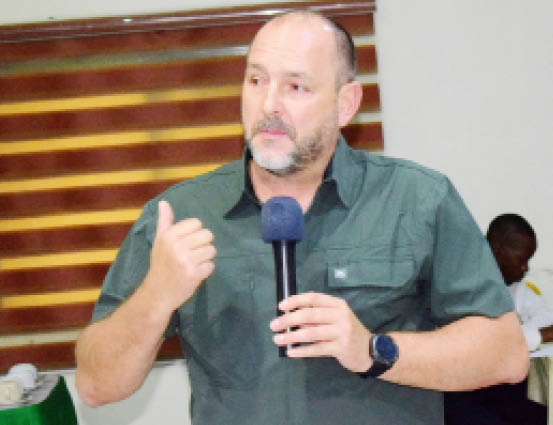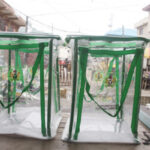Steve van der Merwe is a seasoned seed breeder and Early Generation Seed (EGS) and Production Consultant, African Seed Solutions. He was in Abuja last week to build the capacity of seed companies, breeders on seed ‘Planning and Forecasting.’ Daily Trust on Sunday caught up with him to explain the issues around the continent seed system. Excerpt:
Let’s begin with your seed breeding career in Africa and other continents. What major development have you achieved?
Well, I’ve been in the seed industry for about 30 years. I got my training in South Africa. I’ve got a master’s degree in plant, breeding and genetics and I took some extra curriculum and majored in plant pathology. I started off my career as a breeder, and the first of my seven years career I was doing breeding. In breeding, I did many different things.
Why Africa constantly faces seed shortage
Cocoa Institute moves from crisis to revive research culture
I started as a disease-resistance breeder in corn. I did that for a while. I did trait integration, where you incorporate GM traits into existing lines, I did conversions of yellow corn to white corn and then within the seed company where I was, I also then started a breeding programme where I developed new lines. I realized that I wanted to expand my knowledge and get more information around the business side of the trade as well. So, I ventured into production and within the company where I was for 2 years after that, I became what they call ‘the problem solver.’
My job was to go to a production field and then identify a problem if there was something in the soil or something. I did that for a while. After that, I became responsible for the production of Early Generation Seed (EGS), or parents seed for the Africa region. And then the seed company approached me to go and work in Europe, and so after 13 years, I left the seed company and went to Europe. I stayed in Europe for nine years and there I did a few things. I first started off as a global head of production technology. I was responsible for the implementation of new production technologies into our production teams. I did that for a while and after that, they asked me to develop a new department called Global Parent Seed Department.
Basically worldwide, I was responsible for the production of EGS for the crops that we had. In the last two years, in the seed company that I worked in Europe, I was responsible for the production and supply of all commercial seed for the Europe and African region. Then I decided after 30 years, I had enough of the corporate environment and because I’m very thankful for what the seed industry has given me, I decided I want to give back. And that’s why for about two and a half years ago, I started a consulting business. I work with the Syngenta foundation and my job is to work in African countries with seed companies and I help them to build capacity.
How will you describe the seed industry in Africa compared to countries like USA, Ukraine and Russia, where you have worked?
There are lots of things which are similar and lots of things which are different. So, let’s talk about what is similar. I would say the climate and the potential of the countries. If I look at many African countries, they have a lot of good agricultural potentials similar to what some of these other countries have. However, I would say the big difference that I see in Russia-Ukraine specifically is the scale of operations. Their field sizes are huge: 100 hectares, (one field), 150 hectares (one field) while in Africa, field sizes are very smaller and much more fragmented. I would say the conditions in Africa is much more similar to the conditions in India and Asia, or South America, and certain other countries, in terms of field sizes. And then, the technology, which is applied, is varied. If I compare Africa with Europe and North America, Brazil, and Argentina, and Chile for example, I would say that the application of technology and modern farming techniques has not really reached Africa yet.
With the knowledge of the seed system in Africa and Europe, what do you think is the missing link in Africa?
I would say it is the right of continuous improvement within the agricultural industry. I think the big difference is that in the African context, a lot of farmers and organizations within the seed industry are still heavily reliant on donor money and funds from the government. That’s a good thing and that’s also a bad thing. The good thing is, it keeps the agriculture alive and it make sure that people can put food on the table and it’s absolutely essential. The bad thing is sometimes that also stands in the way of progress and forcing people to think differently about continuous improvement.
How will you compare the seed companies in Africa to the ones in Europe and America where you have worked?
That’s a very good question. I think in Africa; I would separate between international seed companies which has a presence in Africa versus local seed companies. Overall, the general level of technology which is applied in Africa, even for international seed companies is lower. In other words, their investments are not so expensive. The amount of input costs that they spent here is lower compared with other countries. That’s for international seed companies. If I compare international seed companies locally in Africa, with local African seed companies, there is a different in technology. Local African seed companies are not as technology advanced as international companies. And the simple reason is money. They don’t have the funds to invest in expensive equipment. International seed companies have those funds and in a lot of the time, they subsidize what they do in Africa from other regions. I would say that is the big difference. The level of proficiency is another thing. The other thing I would say is that local seed companies are not so exposed to new knowledge from the outside, simply because they are locally situated, while nternational seed companies tend to bring in more technology into Africa and the simple reason is because they have a global reach.
Do you think that governments need to invest more in the system?
Yes, of course, government needs to be the big enabler. It needs to create an environment that enables seed companies and the seed industry to flourish. The way that the agricultural business in African countries work is very different from, for instance, the USA or European countries or Brazil or Argentina. And the big difference is that in Africa, there’s a very close relationship between public and private partnerships and the government plays a very big role in agriculture in developing new varieties and making sure that new varieties get to the market and then seed companies in this public-private partnership play more role at the end of the chain where they take the seed from the government and then use that for production of commercial seed that goes out to be sold to farmers.
The big differences in European countries, North America, Argentina Brazil, is that governments play a much smaller role in developing new varieties. The big seed companies invest in R&D and the development of new varieties. Their variety development is much more exclusive. In other words, you develop a variety and only you have access to sell it. In contrast, in African countries, the government develops a variety that is public property, so everybody gets access to it and because everybody’s got access to it, it makes competition later on very difficult because everybody competes with the same program while in First World countries, your product is unique. So, it’s easier to create selling points around the uniqueness of your product.
A lot of issues are situated around seed planning and forecasting. Why is it so important to the seed industry?
This is the reason why Africa is constantly facing shortages because the reality in Africa today is that there is a mismatch between demand and supply for several reasons. But you know, there is not very good transparency in terms of which varieties or hybrids or crops will be high in demand this year or in low demand next year. So, the industry tends to be much more reactive than proactive in African. In most of the African countries so far, I could not find concrete evidence of a conscientious effort from government or from the seed industry to really understand what is the real demand and how the current supply matches with that demand. It just does not happen.
What do you make of how seed companies in Africa handle seed?
I think the distribution of seed is not bad. In other words, the ability of seed companies when they have seed to distribute it to rural areas so farmers can have access to it, I think, is alright. But if I look at the seed industry; if I talk about how you produce it, the agronomy that you use, how you handle see after that, how you store seed and how you transport seed, I think there’s a big gap between African countries and other countries like Canada, USA, Ukraine, Brazil, Chile and Argentina.

 Join Daily Trust WhatsApp Community For Quick Access To News and Happenings Around You.
Join Daily Trust WhatsApp Community For Quick Access To News and Happenings Around You.


